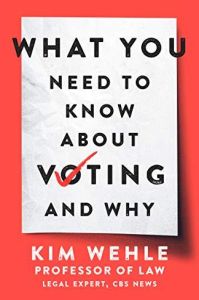Join getAbstract to access the summary!

Join getAbstract to access the summary!
Kim Wehle
What You Need to Know About Voting – and Why
Harper, 2020
What's inside?
Forget the noise of the news cycle; understanding the ins and outs of the US voting system helps you shape the future.
Recommendation
The 2020 US presidential election is pivotal for Americans of all political stripes. But amid the noise of the news cycle, it can be hard to make sense of all the information out there about the practical side of voting. How do you register? How can you keep your registration current? What obstacles might you face when trying to vote, and why? And, most importantly, why should you vote at all? Thankfully, law professor Kim Wehle offers sensible answers to these questions and more in What You Need to Know About Voting – and Why.
Summary
About the Author
Kimberly Wehle is a law professor at the University of Baltimore School of Law. She also holds another teaching fellowship at American University’s Washington College of Law. She is a former legal analyst for CBS News.
















Comment on this summary